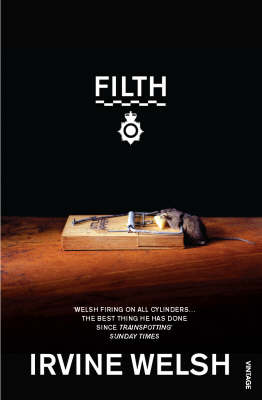A while back, the Guardian wrote an article about a phenomenon called 'reader's block.' He wrote:
"We start (War and Peace, Proust, Goethe, Anne Enright's Booker-winning The Gathering), but we don't finish: we leave them on page 42 in the loo, a constant reminder of our lack of resolve. That, incidentally, is why there is a global shortage of bookmarks. Our trip to the bookshop has been a fool's errand: we remain anxious, but we are poorer."
This has been something that I have been cursed with for the last two months and it's been horrible. Penny has been reading her Robin Hobb like reading is going out of fashion, and I've been reading drips and drops of 'The Wind-Up Bird Chronicle' by Murakami and 'Men at Arms' by Ernest Hemingway. I could write a fairly comprehensive blog on the first 120 pages of Murakami's novel and the first 40 pages of Hemingway's, but it would amount to nothing worthy of reading or remembering. I will therefore write a short summary on both:
Murakami - weird, possibly pretentious, slightly engaging.
Hemingway - good, I will return to, possibly slightly melodramatic.
Right, now that's out of the way with, onto 'The Axeman's Jazz' by Celestin. This book caught my eye in Waterstones and I bought it without really being able to justify why as I didn't think it was a book that I would be able to totally embrace. However, something about it obviously was appealing enough and onto the shelf it went. It is set in New Orleans and focuses on a real serial killer who went on a killing spree in 1919. The novel explores who police, the Mafia and the jazz musicians of the city during that time and how the murders affected each group. Louis Armstrong also makes an appearance in the novel to really give you a flavour of what the city was like during that era.
I read the prologue out to Penny as I thought she would enjoy the suspense caused by it and the grotty way in which the city is presented in it. A local newspaper receives a letter from the Axeman:
When I initially read it, I thought "Oh come on. Be serious. How cheesy can this get?" thinking that the author needed to up his game. However, if I had read the words from the author noting that the letter is a real artifact from the newspaper and allegedly written by the killer, I couldn't have criticised him. Turns out the killer was just that - not a wordsmith.
Celestin gives the reader three different investigators of the murders: Michael Talbot, a Detective Lieutenant under pressure; Luca D'Andrea, his former partner and 'bad cop' who has recently been released from prison for corruption charges; and Ida Davis, a Pinkerton Detective agency secretary hoping to prove her detective skills, held back in the profession because of her gender.
The novel is thoroughly engaging and is an exciting page-turner. If you can suspend your disbelief that Louis Armstrong is involved detecting a real life serial killer, all the better. Celestin gives the reader a fantastic outlook into what life in New Orleans was like in an era just before the Roaring Twenties and manages to give you an insight into how each community had its traditions and struggles, without descending into melodrama.
There have been criticisms that Celestin has created something more like a tour guide than a detective novel but I do not believe this to be the case: it is simply a celebration of a city with a fascinating cultural history. There is a scene where the mayor is making a speech boasting of the city's resistance to any natural disaster, where a cynical journalist is arguing each of his points which makes fascinating reading.
I enjoyed this book and have a lot to be grateful to it for - it cured my 'block' and has got me looking forward to forthcoming novels by the likes of Louis de Bernieres and Jonathan Franzen. I can't wait to get the next book.
Key quotation
Hell, March 13, 1919
Esteemed Mortal:
They have never caught me and they never will. They have never seen me, for I am invisible, even as the ether that surrounds your earth. I am not a human being, but a spirit and a demon from the hottest hell. I am what you Orleanians and your foolish police call the Axeman.
When I see fit, I shall come and claim other victims. I alone know whom they shall be. I shall leave no clue except my bloody axe, besmeared with blood and brains of he whom I have sent below to keep me company.
If you wish you may tell the police to be careful not to rile me. Of course, I am a reasonable spirit. I take no offense at the way they have conducted their investigations in the past. In fact, they have been so utterly stupid as to not only amuse me, but His Satanic Majesty, Francis Josef, etc. But tell them to beware. Let them not try to discover what I am, for it were better that they were never born than to incur the wrath of the Axeman. I don‘t think there is any need of such a warning, for I feel sure the police will always dodge me, as they have in the past. They are wise and know how to keep away from all harm.
Undoubtedly, you Orleanians think of me as a most horrible murderer, which I am, but I could be much worse if I wanted to. If I wished, I could pay a visit to your city every night. At will I could slay thousands of your best citizens, for I am in close relationship with the Angel of Death.
Now, to be exact, at 12:15 (earthly time) on next Tuesday night, I am going to pass over New Orleans. In my infinite mercy, I am going to make a little proposition to you people. Here it is:
I am very fond of jazz music, and I swear by all the devils in the nether regions that every person shall be spared in whose home a jazz band is in full swing at the time I have just mentioned. If everyone has a jazz band going, well, then, so much the better for you people. One thing is certain and that is that some of your people who do not jazz it on Tuesday night (if there be any) will get the axe.
Well, as I am cold and crave the warmth of my native Tartarus, and it is about time I leave your earthly home, I will cease my discourse. Hoping that thou wilt publish this, that it may go well with thee, I have been, am and will be the worst spirit that ever existed either in fact or realm of fancy.
The Axeman
Other thoughts
- It's not a surprise that this novel is written by an author who has experience writing for television. It is equally unsurprising that the novel has been chosen to be televised. It could be similar in mood to 'Boardwalk Empire.'
- Rarely has a novel had such an excellent soundtrack.
















